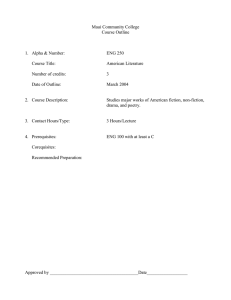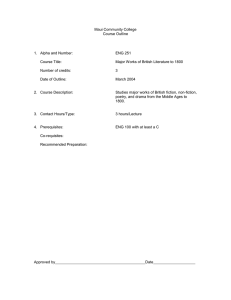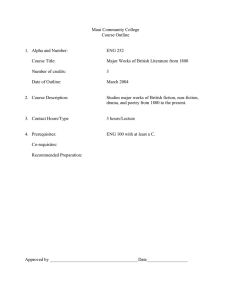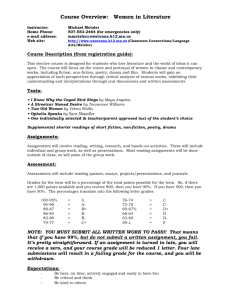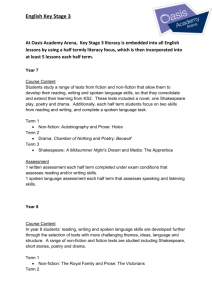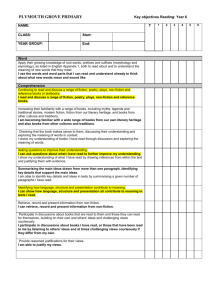Maui Community College Course Outline 1. Alpha and Number:
advertisement
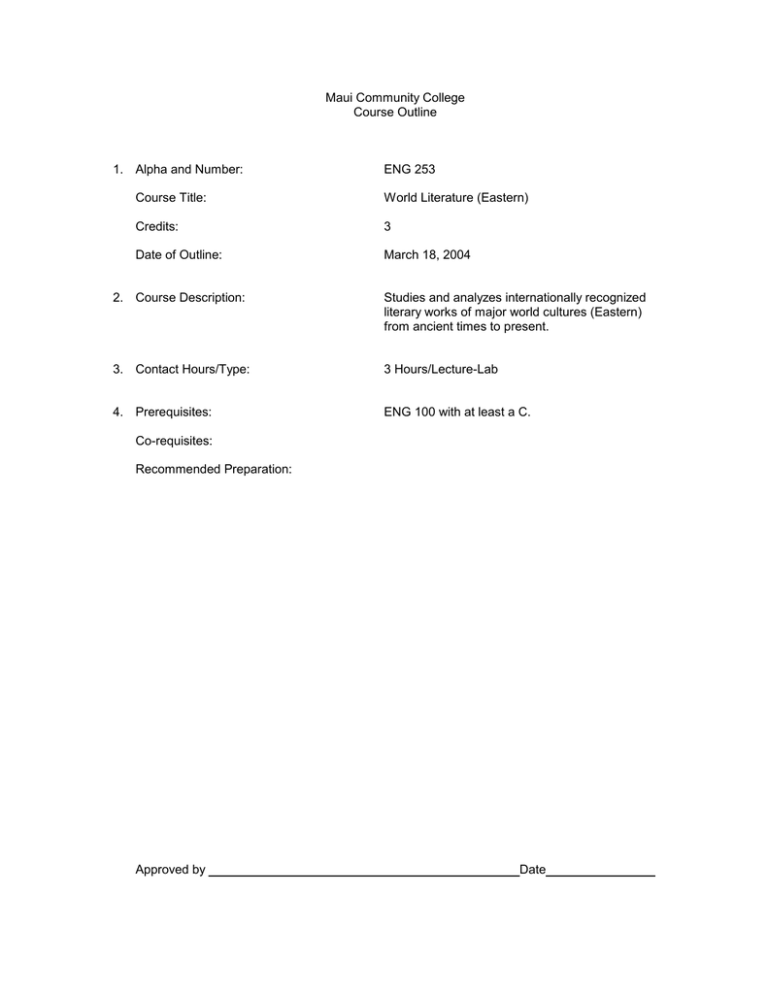
Maui Community College Course Outline 1. Alpha and Number: ENG 253 Course Title: World Literature (Eastern) Credits: 3 Date of Outline: March 18, 2004 2. Course Description: Studies and analyzes internationally recognized literary works of major world cultures (Eastern) from ancient times to present. 3. Contact Hours/Type: 3 Hours/Lecture-Lab 4. Prerequisites: ENG 100 with at least a C. Co-requisites: Recommended Preparation: Approved by Date 2 5. General Course Objectives In ENG 253, students will read, discuss, analyze, and write about representative works of Eastern fiction, non-fiction, poetry, and/or drama. ENG 253 fulfills three of the nine credits for the Humanities requirement for A.A. and three of the 12 credits for the Elective requirement for A.S. degree at Maui Community College. This course also fulfills the requirements for the University of Hawai'i at Manoa General Education, Diversification, Arts, Humanities, & Literatures (DL). For detailed information on how ENG 253 focuses on the Maui Community College general education standards, see the attached curricular grid. 6. Student Learning Outcomes For assessment purposes, these are linked to #7. Recommended Course Content. On successful completion of this course, students should be able to: a. describe works of eastern literature using basic concepts and terminology (plot, character, genre, etc.); b. use appropriate types of literary analysis (formalist, psychological, biographical, feminist, etc.); c. research and organize information from various sources to formulate, develop, and support ideas in essays and oral presentations; d. revise, edit, and proofread essays for correctness, clarity, and effectiveness, using mla style documentation when appropriate; e. examine, analyze, and discuss the moral, political, religious, and sociological challenges shown through the literature of eastern cultures; f. discuss the great ideas and values as portrayed in major works of eastern literature representing various regions from ancient to modern periods; g. revise, edit, and proofread essays for correctness, clarity, and effectiveness; h. demonstrate skill, knowledge, and enjoyment of literature through reading, discussing, and writing. 7. Recommended Course Content and Approximate Time Spent on Each Topic Linked to #6. Student Learning Outcomes. 3-6 weeks: Introduction to Eastern literature, course requirements and Indian prose (poetry, fiction, non-fiction, and/or drama) (a-h) 3-6 weeks: Chinese prose (poetry, fiction, non-fiction, and/or drama) (a-h) 3-6 weeks: Japanese prose (poetry, fiction, non-fiction, and/or drama) (a-h) 1-2 weeks: Optional prose from other Eastern countries (poetry, fiction, nonfiction, and/or drama) (a-h) 8. Text and Materials, Reference Materials, Auxiliary Materials and Content Appropriate text(s) and materials will be chosen at the time the course is offered from those currently available in the field. Examples include: 3 Text(s): Barnstone, Willis & Tony Barnstone. Literatures of Asia, Africa, and Latin America. Upper Saddle River: Prentice Hall, 1999. Easwaran, Eknath. Gandhi the Man. Tomales: Nilgiri Press 1997. Ibuse, Masuji. Black Rain. Tokyo: Kodansha International, 1979. Supplies: Recommended – One (1) three-ring binder with dividers (notes, handouts, completed assignments, & journal) Two - DS/HD 360K 3 ½ “ diskettes and a hard cover case Miscellaneous: Handouts Guest speakers Internet sources 9. Recommended Course Requirements and Evaluation Specific course requirements are at the discretion of the instructor at the time the course is being offered. Suggested requirements might include, but are not limited to: Attendance and Participation Class binder and Personal Notebook Quizzes, Exercises, Daily Assignments Portfolio Collection (including major papers) Midterm Examination Final Examination 10. Methods of Instruction Instructional methods will vary considerably with instructors. Specific methods will be at the discretion of the instructor teaching the course and might include, but are not limited to: a. b. c. d. e. f. g. h. i. j. k. l. large group lecture; small group activities; in-class exercises; class or small-group discussion; peer presentations; computer, website, or video presentations and research; audio or other spoken-word presentations; guest lectures; research; one-to-one consultation and conferences; peer editing of written work; WebCT.
